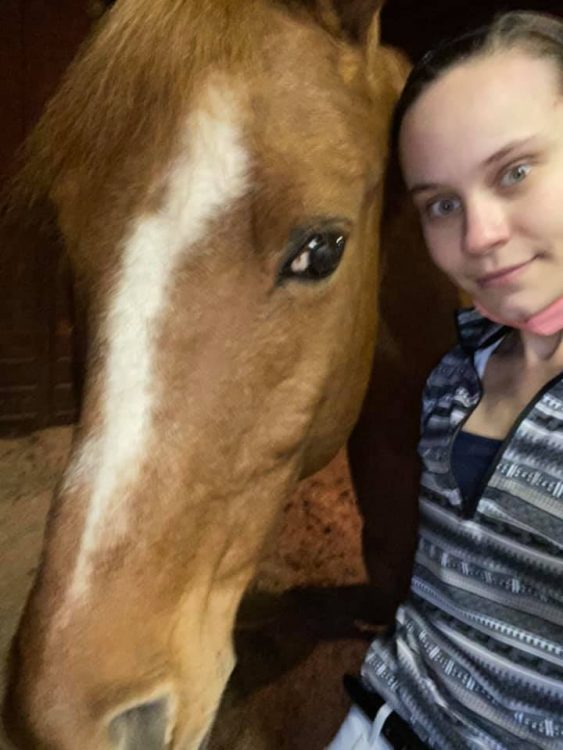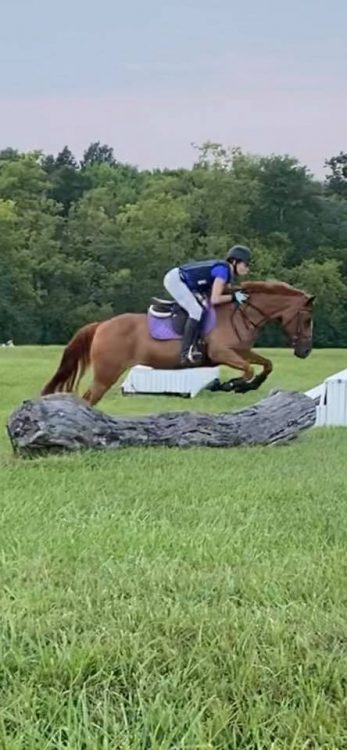People always ask me “how I do it.” They want to know how I can be so ill yet work full-time, go to school, and own and ride a horse.
“I don’t know — I just do it,” has always been my answer. That’s a lie, though. I don’t “just do” anything.
I break, cry, shut down, and work myself into the ground. I do it all in an effort to get a job that’s better suited for my body and is able to pay enough for me to afford life with my chronic illness. I used to be on disability, and unfortunately, the full amount of disability payments wasn’t enough for me to even be eligible to rent an apartment in my area — let alone pay for medical coverage that wasn’t covered by health insurance. I have to work full-time to keep my health insurance — which I absolutely can’t do without. I’m also going to school to earn a second degree that will allow me to have a well-paying, more sedentary job that still interests me. To be honest, owning my horse isn’t a choice either. She is the one who keeps me going. She is the reason I am still alive and push myself to keep trying day in and day out.

This year has not been kind to me. The year started with me contracting COVID-19 — which was the thing my medical team and I feared most. I also had to have abdominal surgery on top of all of the other tests and procedures. That surgery went from an outpatient procedure to an inpatient procedure. I was then re-hospitalized with surgery complications — followed by another hospitalization for an infection. My GI system wasn’t tolerating any kind of traditional nutrition sources. We hoped switching to separate G-tubes and J-tubes would be the answer, but it wasn’t. My blood sugar was frequently getting dangerously low. I was then hospitalized to be put on total parenteral nutrition (TPN) as a last resort. TPN is nutrition given through a central line (which is kind of like an IV), and it allows my body to receive the fuel it needs by bypassing the GI tract. I started out hooked up to the IV bag and pump 24 hours per day and am now hooked up for 18 hours a day.
I want to be my “normal” self, but I can’t. I can’t just go out and ride my horse when I want to because I only get six free hours a day to not be attached to that bag. If I don’t plan it out and time it perfectly, I can’t ride. If I ride at the wrong time, the summer heat in Kansas will cause me to sweat off my port dressing — which puts me at massive risk for developing a blood infection. It really sucks to finally get nutrition and have energy but not be able to use it to ride my horse. I still see her, though, and I do ground work too. My horse is the best therapy that exists for me.

So how do I do it? How do I work full-time nights, go to school full-time during the day, care for and exercise my horse, go to medical appointments every week, go to physical therapy, manage my feeding tubes, manage my TPN, and manage my chronic illness full-time? It all comes down to precise planning and a set of routines I have developed. I have to plan every minute of my day in order to make everything work. It is a very fragile process, and it does not have flexibility because flexibility isn’t really possible when you have to manage so many things at one time. I have to take medications at certain times, start and stop TPN at specific times, start and stop tube feeds at specific times, and attend class on campus at specific times.
I think I say “I just do it” because the systems and routines I’ve developed to make my medical life work have become so engraved in my brain that I don’t realize they aren’t “normal” for most people. For me, it is typical to give myself meds through my tube when I am in my car. It’s also “normal” to have to pack an entire day’s worth of prepared syringes of medications with times written on them so that I don’t forget to take them. I’m used to having several pairs of clothes in my car for my job, the barn, and school. I also tell myself “This is only temporary. This stress will be worth it. It’s only two more years of school, and then my life will get better,” for my entire hour-long drive from work to class. If my daily process falls out of line because of a traffic jam, I worry because I literally don’t have the time in my schedule to cope with it. A traffic jam can mean I lose my only two hours of sleep before going into work. It can mean I don’t get hooked up to my TPN on time — resulting in that entire six-hour block I had planned for to be shifted.
Life with my illness takes constant self-discipline, positive self-talk, and reminders that I don’t have to be “strong” while I do everything, but I do need to keep doing it. I have learned that letting myself believe I am strong is a dangerous thing. It leads to me shutting down my emotions and my mind-body connection. The crash that results is not fun. When I let myself think I’m strong, all of my limits go away, and I push myself way too far to shut out the pain.
So how do I manage my life as a full-time healthcare worker, student, equestrian, and patient? I plan, develop systems, reassure myself, and feel my emotions. I’m not perfect, and things don’t always work out as well as they may appear. Just know that I have likely planned for what is going wrong in any given moment so I am able to adapt if it happens.
Image via contributor.

